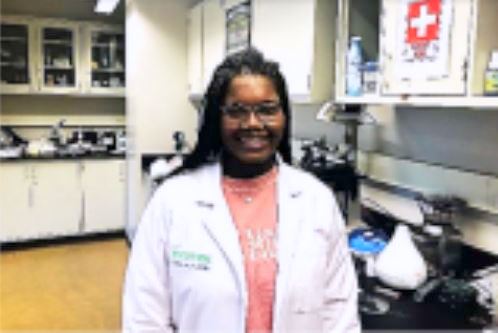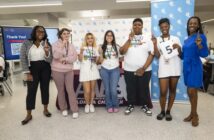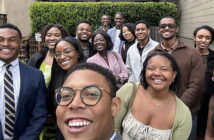Kennedy Barnes (Courtesy Photo)
Food insecurity in Africa has existed for many years. It has not only affected the
health of the populations across the continent, but it has subsequently created
economic hardship for millions of people. Kennedy Barnes, a 12th grader at
Renaissance High School in the City of Detroit, and a senior life science
researcher in Ecotek Lab-Detroit, has used her creativity in life science and her
understanding of 3D printing and polymer science, to create an edible Vitamin
A/iron enriched supplement to help combat malnutrition on the continent of
Africa. While in the lab, Kennedy has been exposed to a wide range of hands-on
research from biobanking to DNA isolation to bacteriology.
The idea of using a 3D printer to produce high energy edible food supplements to combat malnutrition in developing countries is very creative and leverages the technology of on-demand printing of food. Kennedy has spent many hours in the lab and at home working on the chemistry of the supplement. She has made multiple samples of the supplement with the goal of finding the perfect balance of taste, texture, and nutritional value. Kennedy has shared her research with scientists at major universities and professionals in the technology field. On August 21, 2020 Kennedy’s research project won first place at the IT Showcase during the 2020 Black Data Processing Associates National Conference. On December 4, 2020 she presented her research at the 2nd Annual African International Conference on Industrial Engineering and Operations Management.
The unique value of Kennedy’s research is that it can help people throughout the
African continent and the world. Kennedy focused her attention on helping the
people living in Zimbabwe. According to the UN Food and Agricultural Organization
(FAO), Zimbabwe is a landlocked southern African country with a total land area of
over 39 million hectares, with 33.3 million hectares used for agricultural purposes.

Iron fortified supplement prototypes (Courtesy Photo)
The remaining 6 million hectares have been reserved for national parks and wildlife, and for urban settlements. Chronic malnutrition and stunting remains a major
challenge in Zimbabwe. The country has a double burden of malnutrition, where less than 10 percent of children aged 6–24 months consume the minimal acceptable diet.
To help other aspiring life scientists in her community learn about her research, Kennedy has prepared a project video highlighting her lab work and research activities.
For the last half of her senior year in high school, she will be working with members of the UN Permanent Mission of Zimbabwe, USAID and the World Bank to secure funding to beta test the 3D printed food supplements in food insecure communities in the capital city of Harare, Zimbabwe.



